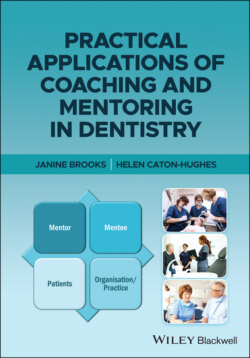Читать книгу Practical Applications of Coaching and Mentoring in Dentistry - Janine Brooks - Страница 21
Reverse Mentoring
ОглавлениеReverse mentoring, sometimes called co‐mentoring, refers to initiatives in which, for example, older individuals are paired with and mentored by younger individuals on topics such as technology, social media, and current trends.
In organisations that rely heavily on technology, reverse‐mentoring is seen as a way to bring older colleagues up to speed in areas that are often second nature to younger people, whose lives have been more deeply integrated with digital technologies.
The idea that practice owners might learn from Foundation Trainees (FTs) goes against traditional professional practices, where more experienced dental professionals provide the most input, make decisions, and provide mentorship to newer professionals with less experience. Nonetheless, the fast‐moving developments in technology, materials, and techniques in dentistry has reversed this logic; older professionals may have experience and insight, but lack skills in newer technologies and may not always recognise their potential.
Being mentored by a new colleague, takes a shift in attitude; it's an opportunity for give and take, where individuals share their knowledge, boosting everyone's understanding and improving overall communication and collaboration.
Reverse mentoring plays an important role in bridging intergenerational gaps: baby boomers (born between 1946 and 1964), Generation X (born between 1965 and 1976), and Generation Y, also called millennials (born between 1977 and 1996). A new generation is entering the workplace, Generation Z (born from 1997 onwards). In any one dental practice it will be commonplace to find four generations of dental professional working together. This will present both great opportunities and great challenges.
These groups have experienced vastly different social and cultural situations, resulting in varied work ethics, mindsets, and attitudes.
This has led to prejudices and stereotypes forming. For instance, some people view millennials as spoiled, unmotivated, and self‐centered, while some millennials view older generations as inefficient and resistant to change.
Professionals need to learn how to cross the generational divide and communicate with, motivate and engage colleagues. Reverse mentoring challenges these stereotypes, and benefits team members, patients, and organisations alike.
